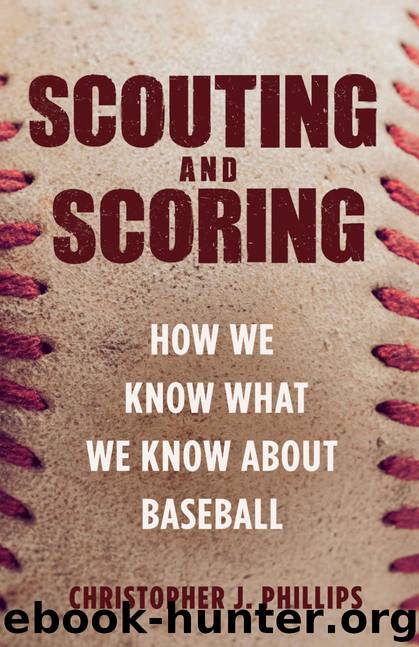Scouting and Scoring by Phillips Christopher

Author:Phillips, Christopher
Language: eng
Format: epub
Publisher: Princeton University Press
Published: 2019-03-25T16:00:00+00:00
In the 1980s Leon Hamilton regretted, above all, not having the time to see as much as he had in the “old days.” The term “scout” originated in a military context, derived from the old French escouter, “to listen.” Generals sent scouts forward to listen for information about the enemy. By the time the term was applied to baseball, however, it was the eye, not the ear, that dominated metaphors. The best scouts were defined by superior vision, by being able to see what others would miss. Vision is central to scouting—it’s implicit in the “ivory hunter” and “diamond in the rough” metaphors. Tony Lucadello used to explain his habit of searching for coins on the ground before a game: “When I can’t find any more pennies,” he claimed, “that’s when I’ll know I don’t have the eyes to be a scout. That’s when I’ll hang it up.”53
More commonly, vision talk among scouts was about how to watch prospects themselves. Lou Gorman, a longtime scout and general manager, noted that from the perspective of the front office, the time scouts had to watch prospects was essential. “If I go out and look at a player for two games and I’ve got a scout that’s seen him for 10 or 15 games and he likes him, I’d better stick with his judgment,” he declared. Fred McAlister agreed that time watching prospects was essential: “The only way to know about a player is to see him, the way he runs, his coordination, and all his baseball skills.” Even, perhaps especially, in cases involving a phone call about a player, scout Cecil Espy explained that “I don’t ever do my scouting over the phone like that. I always want to see the kid for myself.” Veteran Cubs scout Lennie Merullo emphasized that “[you] have to scout with your eyes and not with your ears”—that is, a scout should doubt what he heard until he saw it for himself.54
Not all views were equal. Buck O’Neil claimed that a scout might learn more about a player by watching him in infield practice or batting practice than by seeing him in a game. Some situations were easier than others to witness—it might take many games to observe players in high-pressure situations or batting against hard-throwing left-handers. Jack Doyle, who scouted for the Chicago Cubs during the 1920s and 1930s, when night games were becoming more common, claimed that at least in one case, he scouted a player over five games to be sure that he could translate what he saw “under the arc lights” into day games at Wrigley Field. Similarly, Lucadello claimed that things look quicker, faster, and better under the lights—but such visions are “illusions.” Brandy Davis wanted to see pitchers in day games since only with natural light could he “really tell what his pitches do.”55
Scouts and clubs had systems for viewing players. Lucadello, who previously pointed out the eight sections of the body to watch, also claimed that there were eight positions
Download
This site does not store any files on its server. We only index and link to content provided by other sites. Please contact the content providers to delete copyright contents if any and email us, we'll remove relevant links or contents immediately.
Enlightenment Now: The Case for Reason, Science, Humanism, and Progress by Steven Pinker(7313)
A Journey Through Charms and Defence Against the Dark Arts (Harry Potter: A Journey Through…) by Pottermore Publishing(4811)
The Immortal Life of Henrietta Lacks by Rebecca Skloot(4588)
A Journey Through Divination and Astronomy by Publishing Pottermore(4385)
Elon Musk by Ashlee Vance(4127)
Origin Story: A Big History of Everything by David Christian(3692)
COSMOS by Carl Sagan(3625)
Alchemy and Alchemists by C. J. S. Thompson(3521)
Bad Pharma by Ben Goldacre(3428)
Enlightenment Now by Steven Pinker(3368)
Shadow of Night by Deborah Harkness(3368)
Inferior by Angela Saini(3314)
A Mind For Numbers: How to Excel at Math and Science (Even If You Flunked Algebra) by Barbara Oakley(3307)
Origin Story by David Christian(3201)
The Code Book by Simon Singh(3189)
Signature in the Cell: DNA and the Evidence for Intelligent Design by Stephen C. Meyer(3138)
The Elements by Theodore Gray(3057)
A Brief History of Time by Stephen Hawking(3024)
A Journey Through Potions and Herbology (A Journey Through…) by Pottermore Publishing(2852)
